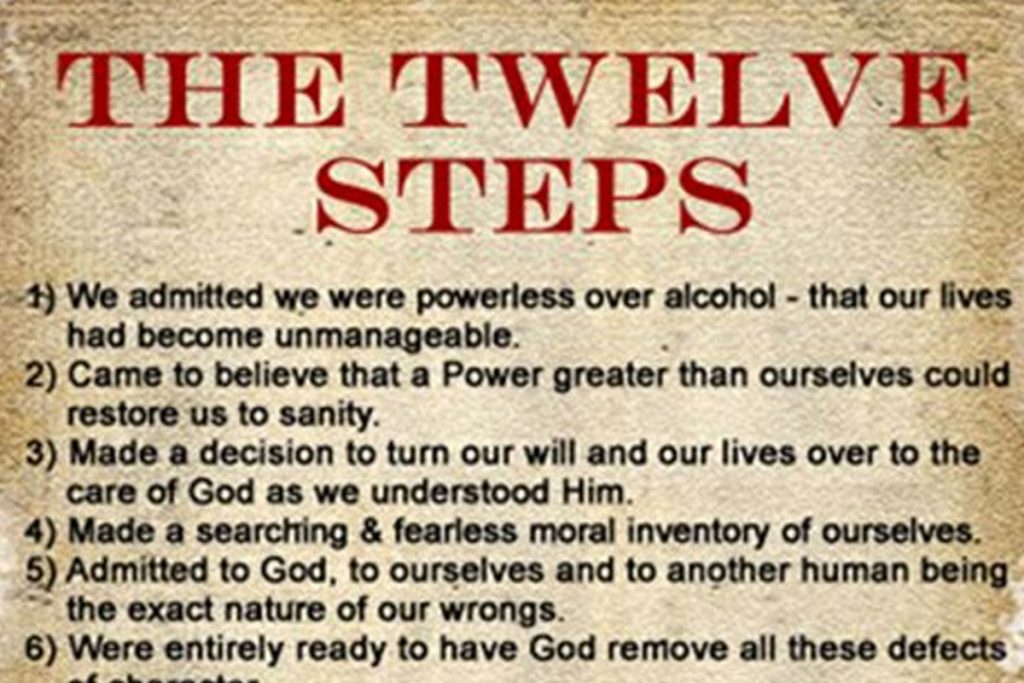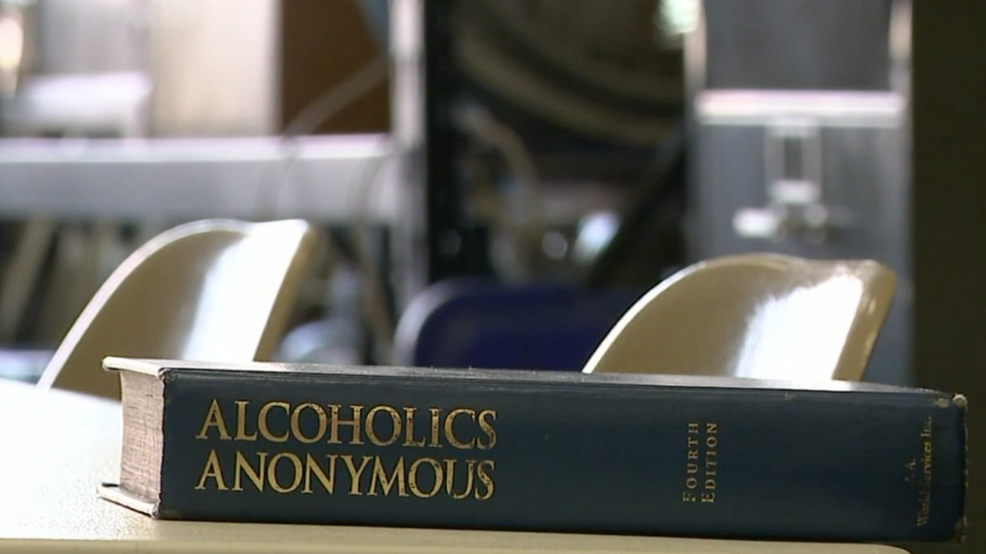The 12 Step addiction recovery programme has been around for decades. It has saved countless lives of those that suffering from addiction.

In the eyes of many addiction treatment professionals it is the best recovery programme to follow, enabling personal recovery from active addiction.
Doctors, counsellors, psychotherapists, scientists and psychiatrists all recognise the Twelve Steps as the most successful mutual aid method of recovery.
Many addiction treatment rehabs also include elements of the 12 Steps within their rehabilitation programmes. Some rehabs solely teach the Twelve Steps of recovery to their patients.
At Delamere we recognise that every individual person suffering from an addiction or compulsion has differing treatment needs. This is why our treatment programmes are completely bespoke and incorporate many different evidence based treatment therapies, one of which is an introduction to the 12 Step programme of recovery.
Do the 12 Steps work for everyone?
Not everyone suffering from alcoholism or addiction responds to the 12 Step recovery method. Most individuals suffering from this life threatening condition also have treatment needs outside the realms of the Twelve Steps.
Even the programme itself recognises this and encourages additional counselling, medicine and therapy for issues that are not covered within the 12 Steps.
For some individuals suffering from addiction, it is necessary that they are removed from society so they can undergo detoxification and intensive treatment within a temptation free environment. Their compulsion is too strong for them to get well through attending 12 Step meetings alone.
This is why attending a CQC registered rehab that treats the individual as a whole person is absolutely necessary for some.
What is 12 step addiction recovery?
12 Step addiction recovery is a programme of recovery that can be accessed through mutual aid groups known as 12 Step fellowships.
The 12 Step recovery programme that is used today was initially developed in the 1930’s in Akron, Ohio by a stockbroker and a doctor who found a means to stay sober (1)
Both men had suffered horrendously at the hands of alcoholism and had failed to respond to the limited and outdated treatment methods available at the time.
Addiction is far better understood today and has been medically recognised as a chronic and progressive brain disease, characterised by compulsion, continuation despite negative consequences and relapse (2)
As a result, more cutting edge and holistic methods that have been proven to work are now applied by some of the more elite rehabs available. Delamere being a first class example.
At Delamere we apply a combination of traditional evidence based addiction treatments combined with a host of proven holistic therapies to heal our guests comprehensively and on every single level.
What are the 12 Steps of addiction recovery?
AA’s suggested twelve steps were first published in 1939 in the book of Alcoholics Anonymous – referred to by AA members as ‘the big book’ (1)

Since then further additions of the book have been released with new stories relevant to modern times. The content of the rest of the book and the 12 Steps has remained unchanged.
Due to the outstanding success of AA, variations of the 12 Steps have been developed to cover a wider selection of addictions and compulsive behaviours. All 12 Step recovery fellowships follow the same set of guiding principles as the original 12 Steps of AA.
The American Psychological Association (APA) who recognise the 12 Step addiction recovery programme as a valid method of maintaining recovery, summarize the process of the steps as involving the following:
- Admitting that one cannot control their alcoholism, addiction or compulsion
- Coming to believe in a higher power that provides inner strength and guidance
- Examining past mistakes with the help of an experienced member of the group ( a sponsor)
- Making amends for these past errors
- Learning to live a new life with a new moral code of conduct and healthy behaviours
- Helping others who suffer from the same addiction/compulsion (3)
How does 12 Step recovery work?
The 12 Step recovery process works by bringing about a complete change in mindset and behaviour, that is conducive to ongoing recovery.
In essence the 12 steps could be viewed as a process of cognitive change.
It has long been recognised that those who suffer from addiction, suffer from a mind set that feeds active addiction. Even with the substance or behaviour removed, the brain still compels the sufferer to engage.
By going through the process of the 12 Steps cognitive change is brought about. A huge shift in thinking and behaviours can be established and maintained.
This is why the 12 Step process works for so many and is especially helpful in maintaining personal recovery and encouraging ongoing personal development
Cognitive behavioural therapies, counselling, medications and behavioural modification therapies are all recognised traditional methods of treating addiction. They are applied by many rehabs to bring about a much needed change in a sufferers thinking (4)
Will I have to work a 12 step programme for the rest of my life?
This will depend entirely on you as an individual. Some people manage to get sober and clean by just attending meetings or going through the 12 Steps, then returning to daily life.
However, as part of the 12 Steps strongly recommends frequently working with newcomers and helping them through the steps to ensure ongoing personal recovery, many find that continuing to attend meetings and practicing the 12 steps is essential to preventing relapse.
Although the primary reason for attending a 12 Step addiction recovery meeting should not be to make new friends, many find they build a circle of trusted people whom they can talk to at any given time. This can prove invaluable in recovery.
When attending a 12 Step recovery meeting you will meet people from all walks of life with different periods of sobriety.
From the ‘newcomer’ who is in their early days, weeks and months of recovery to ‘old timers’ who have many years of continued recovery under their belts.
If 12 Step recovery works for you, then why would you leave and risk relapse? Yet many do, due to the nature of addiction. A large proportion of those that leave the 12 Step programme do sadly relapse. Some make their way back to the recovery meetings, others are not so lucky.
What 12 Step recovery is and what it is not
12 Step recovery is freely available to anyone with a desire to stop drinking or taking drugs. There are also 12 Step recovery fellowships for those suffering from a process addiction ( an addiction to an activity, person or behaviour)
12 Step recovery offers a very different way of life to active addiction and one that is abstinent based.
Participants of the 12 Step meetings are free to come and go as they please as long as they are not disruptive to the group
12 Step meetings are fully self supporting. Participants donate whatever they can spare to help cover room rental, tea, coffee and free literature.
What the 12 Steps are not is a substitute for professional therapy. Many that attend 12 Step recovery find that at some point they need professional counselling or therapy to heal unresolved issues.
Some people that attend 12 Step meetings will have already undergone a programme of healing by attending a rehab programme.
The 12 Steps do not conflict with therapy treatment and compliment it very well. Medical matters, religious matters and mental health matters should be addressed by the appropriate professionals.
The 12 Step recovery programme also does not cover detoxification and should only be applied once a person has safely detoxed. The meetings do however provide a much needed support network and safe haven for those undergoing a community detox They also provide hope by setting an example of what can be achieved in 12 Step recovery.
The Twelve Steps are not bespoke or flexible. Because of this, they do not work for everyone. They are designed to be worked in a specific set order and in their entirety to secure ongoing recovery.
Alternatives to 12 Step Recovery
12 Step recovery works for many, however many seek alternative methods of addiction treatment.
At Delamere we believe there is no such thing as one size fits all when it comes to successful addiction treatment. This is why our treatment and behavioural wellness programmes are intricately tailored to each individual guest that stays with us.
Every person is individual, has their own beliefs and different experiences. Different aspects of their lives can also be affected differently by addiction, it is a very personal thing.
Alternatives to 12 Step recovery include local drug and alcohol support groups, rehab programmes, rehab aftercare, SMART meetings, counselling and holistic healing practices.
Many people will opt for a combination of different recovery groups or healing practices to ensure that all aspects of them as an individual are treated comprehensively.
Accessing complementary addiction treatment methods in addition to the 12 Steps also encourage continued personal growth.
Where are 12 Step recovery meetings?
12 Step recovery meetings can be accessed all over the world. Back when meeting first begane they were held at people’s houses, now they are held in public places such as churches or community centres

Wherever you live there is usually a 12 Step recovery meeting available within a relatively short travel journey.
For those that do not have any local meetings, there is always the option of starting one by applying to rent a room on public premises and going to the nearest district meeting for newcomer packs and literature.
Details of starting new recovery meetings for 12 Steps can be found on the associated fellowships registered websites.
Details of meeting locations, days and times can also be found by visiting a 12 Step recovery website, or by visiting a meeting and asking for a meeting handbook. (5)
Addictions 12 Step addiction recovery covers
Initially the 12 Steps of recovery was only designed to treat alcoholism. However it was found that the method and principles could be applied to ANY addiction.
Around the world there are new meetings opening every single day. The 12 Steps have now been adapted to cover numerous common addictions, including narcotics, cocaine, gambling, overeating, marijuana, sex and codependency.
It has now been medically recognised that addiction is a brain disease and the behaviour, drug or compulsive activity is a symptom of that disease. It therefore stands to reason that what works well in treating one addiction works in treating others.
Can 12 Step recovery help family?
12 Step recovery can indeed work for family and for anyone who has been affected by someone else’s addiction.
There are sister fellowships that are solely available for family, friends and partners of those suffering from an addiction. They can attend these meetings freely, regardless of whether their loved one is in any kind of recovery or still in active addiction.
12 Step fellowships for family practice a similar version of the 12 step addiction recovery programme, they include fellowships such as Al-Anon for family of alcoholics (6) and Co-Anon ( family of cocaine addicts)
Do I have to believe in God to work a 12 step programme?
This is a common question asked by those that are new to 12 Step recovery and the answer to this is simple – no you do not have to believe in God in order for the 12 Steps to work.
Although the 12 Steps frequently mention the word God, over the years many that attend 12 Step fellowship meetings have come to find their own understanding of God or a power greater than themselves.
The 12 Steps of recovery have also been known to work for some diehard atheists who use the group meetings as their higher power or the spirit of someone whom they loved and respected but has passed. Others commonly choose a spiritual connection to the universe or nature.
The key to the 12 Steps working is understanding that your way of trying to overcome addiction didn’t work and so surrendering to a greater power and working the steps is a must.
Some people have been known to stay sober and clean by only attending meetings and not going through the 12 Steps. This however is not recommended, at the very least it tends to lead to ‘dry drunk syndrome’, at worst relapse.
Whilst some people who access 12 Step recovery already have a God or religion that they follow. They find that just believing in God isn’t enough, or they wouldn’t require the 12 Steps.
Others have a fixed childhood conception of God or have an understanding of a judgmental God that they fear.
Whatever their previous conception of what God is or is not, the 12 Steps teach them to find a loving God or connect with a loving and truthful power. There is no room for judgment or punishment in recovery.
Sadly, for some the mere mention of God in a meeting sends them running for the door. This is why it is so important to listen with an open mind and understand that everyone is entitled to their own concept of a greater power.
Need help in overcoming an addiction?
As previously mentioned, some individuals suffering from addiction are unable to arrest their addiction in the community, no matter what methods they try.
Delamere provides a first class haven for those seeking detoxification and recovery from any kind of addiction.
Our distinguished colleagues here at Delamere offer a very compassionate and understanding approach to addiction treatment. We firmly believe that those who come to us for help have suffered enough and that having an addiction is not their fault or choice.
Our recovery programmes are entirely bespoke and designed to treat each guest physically, psychologically, behaviourally, socially, emotionally, occupationally and spiritually. All key areas of a person’s life that are often very damaged through active addiction
For immediate help and support call our team of addiction experts today – 0330 111 2015.
References:
- Alcoholics Anonymous Historical Data https://www.alcoholics-anonymous.org.uk/about-aa/historical-data
- The neurobiology of substance use, misuse and addiction American Psychiatric Association – Diagnostic and statistical manual of mental disorders (DSM-5). 5th ed. Arlington, VA: American Psychiatric Publishing; 2013.
- American Psychological Association – Twelve-Step programme https://dictionary.apa.org/twelve-step-program
- Treating alcoholism – Healthline https://www.healthline.com/health/alcohol-addiction-treatment#treatment
- AA meetings near me https://www.alcoholics-anonymous.org.uk/AA-Meetings
- Al-Anon UK https://www.al-anonuk.org.uk






